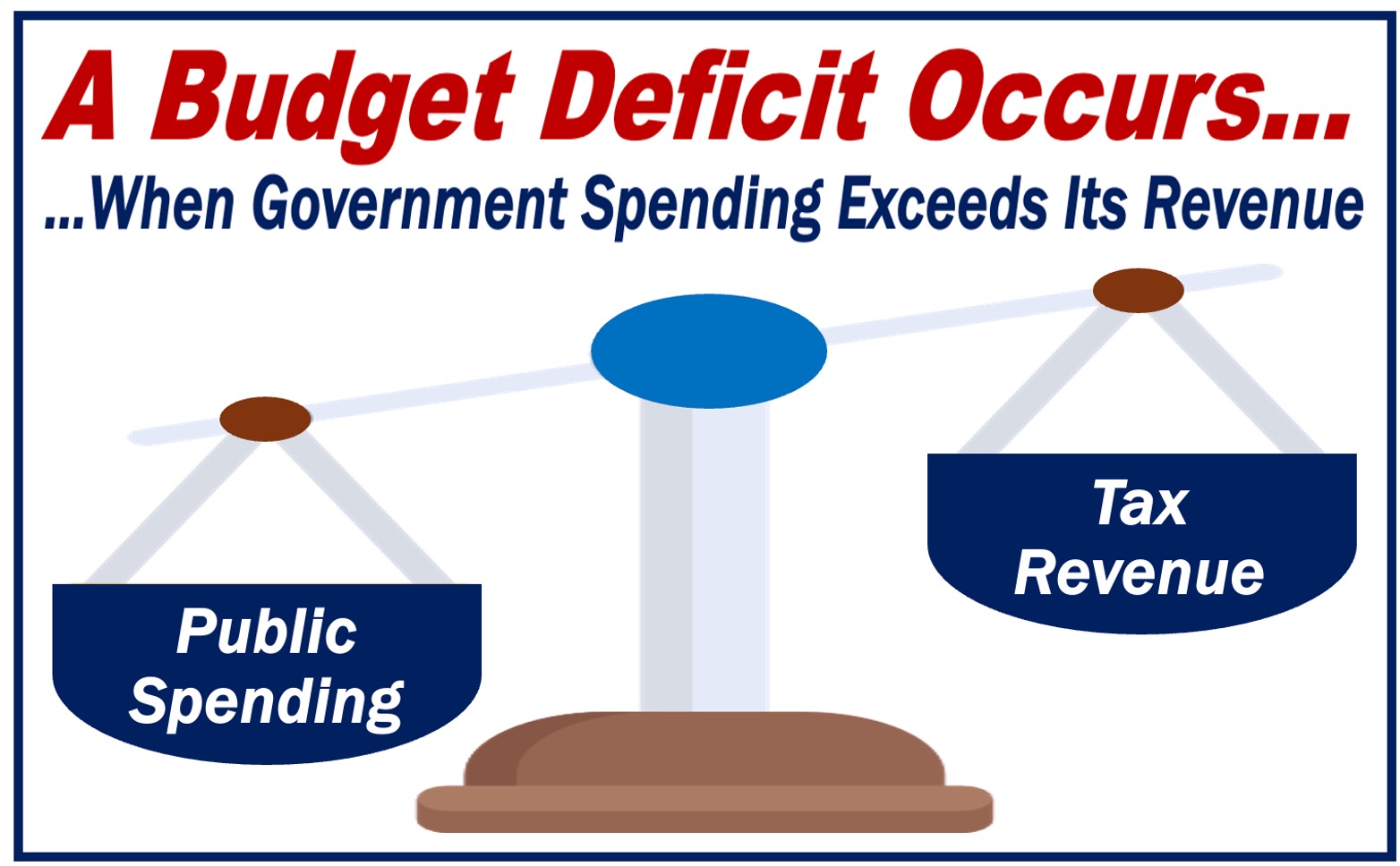What is a Budget Deficit?
If your government spends more in one year than it collected in taxes and other revenue, it has a Budget Deficit or Fiscal Deficit. If it spent less than its revenue, it would have a Budget Surplus.
Similarly, if you spend more each month than you earn, you will be in deficit – you will be running short. However, we do not use the term “budget deficit” for individuals or households, only for national, state, or local government.
Deficits are much more common when there is a national or global crisis. During the COVID-19 Pandemic, which started in March of 2020, most countries across the world built up or increased their deficits. In fact, the advanced economies ran up considerable deficits as they attempted to help companies and households whose incomes had dried up.
The Cambridge Dictionary has the following definition of the term “Budget Deficit” plus an example sentence containing the term:
“The amount of extra money that a government needs because it has spent more money than it earned. Example Sentence: ‘The White House says the US federal government will run a $9 trillion budget deficit over the next decade.'”
Why Do Budget Deficits Matter?
Even though governments try to avoid budget deficits or keep them from getting too big, they are not inherently bad. In tough economic times, they may have to spend more to jumpstart the economy.
However, if a deficit gets too big, or persists for too long, there can be negative consequences:
-
Debt
The only way you can spend more than you earn is by borrowing. It is the same with governments. When a government borrows money, it adds to the national debt – the total amount it owes.
High levels of debt can become a serious burden on future generations.

Governments must pay interest on their debts. These payments can eat up a chunk of their budgets, which means less money for education, infrastructure projects and maintenance, police, health, etc.
Just servicing a debt, if it is very high, can be expensive. To service a debt means to make regular interest payments on the amount borrowed.
Too much borrowing by the government can lead to inflation, as can printing more money to cover deficits. If prices rise every month, people’s purchasing power can fall, especially if their wage rises are lower than the inflation rate.
-
Investor Confidence
A country’s budget deficit may reach a point at which investors start to worry about its ability to pay. The country’s sovereign credit rating may deteriorate, which may make it more expensive to borrow money.
How Are Deficits Measured?
There are two main ways we can measure a budget deficit:
-
Absolute Size
This is the total amount, that is, the amount by which spending exceeds revenue in a given year. This is usually measured in the country’s local country or in US dollars for international reporting.
-
Percentage of GDP
This is the deficit as a proportion of the overall size of the country’s economy, that is, its gross domestic product (GDP). This figure is much more meaningful than the absolute size.
-
An example
If I say that a country has a deficit of $200 billion, it does not mean much if I do not mention the name of the country. We do not know how big its economy is.
If the country’s GDP were $10 trillion, then $200 billion, which is 2% of GDP, is seen as manageable.
However, if GDP were $400 billion, it would be a budget deficit of 50% of GDP, which is a substantial economic challenge.
According to the US Treasury, in 2023, the United States budget deficit was $1.7 trillion, which equaled 6.4% of GDP. This was slightly higher than the OECD average of 5% of GDP in that year.
Tackling Large Budget Deficits
There are several things a government can do if it wants to reduce a large deficit. Let’s take a look at them:
-
Reduce spending
If the government cuts spending but keeps its tax revenues at the same level, its deficit will decrease.
This measure can be politically unpopular. Whoever suffers from the cuts will not like it.
-
Raise taxes
By raising taxes, the government’s income will be more closely matched to its spending. Taxes may be increased on people’s incomes, corporate profits, sales taxes, property taxes, capital gains taxes, excise taxes on specific goods like tobacco and alcohol, inheritance taxes, to name a few.
This measure may also be politically unpopular. Governments rarely do this, or reduce spending in an election year.
-
Economic growth
If companies sell more, make more profits, wages go up, and unemployment falls, government revenue will rise, which will help reduce the budget deficit.
-
Privatize state companies
If the utility companies, telecom businesses, railways, and other entities belong to the state, the government could consider floating them. Floating, in this context, means selling the shares of a state-owned company to the public in a new stock issuance, thereby making it a publicly traded company on a stock exchange.
Some people, especially critics of floating state companies, refer to this as “selling the family silver.”
Final thoughts
Budget deficits occur when the government has spent more than it earns. At times, they can be useful to kickstart the economy. However, if they grow too big, they can harm the economy.

